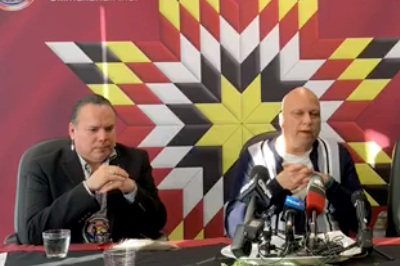In response to the COVID-19 pandemic, the 26 Northern Manitoba First Nations represented by Manitoba Keewatinowi Okimakanak (MKO) are being asked to ban gatherings smaller than what the provincial public health department currently recommends due to the poorer living conditions and health of their residents.
“We’ve asked our communities to stop all gatherings of 10 [people] and over,” said Dr. Barry Lavallee, a medical advisor for MKO’s Keewatinohk Inniniw Minoayawin, at a March 18 press conference in Winnipeg.”We need to take more aggressive measures.”
The provincial public health department is currently recommending no gatherings of 50 or more people.
MKO First Nations are also being asked to cancel school day care and head start programs immediately, if they haven’t done so, and to monitor who is coming and going from their communities.
“We’re asking the communities control their borders effective immediately," said Lavallee, adding that any doctors or nurses who have travelled internationally should not be sent to work in First Nations until 14 days after they return to Canada. “We do anticipate there will be a reduction in some health services going forward.”
MKO Grand Chief Garrison Settee said northern First Nations have to go further than the overall public health recommendations because they have overcrowded housing, many residents with underlying medical conditions and fewer health services available.
“First Nations are at a greater risk and they’re more vulnerable than the rest of Canadian society,” Settee said. “The living conditions in the north are very different. It will spread fast. Our response will determine the impact of the virus in our First Nations.”
Chief provincial public health officer Brent Roussin said there have not been any positive tests for COVID-19, also known as the coronavirus, on any Manitoba First Nations as of March 18. The kits used to test for the virus are the same as those used to test for any other respiratory infection, Roussin said, so there’s no reason testing can not be done in First Nations if that becomes necessary.
Lavallee said if testing does occur in MKO First Nations, it may be done in an alternate location rather than a nursing station or health centre, such as a school building.
Settee said the North West Company, which operates Northern stores in many northern First Nations, has assured him that they are taking steps to ensure an adequate inventory of food as well as sanitation supplies and that prices will not go up during the pandemic. There is a dire need for sanitation products in MKO First Nations at this time and Settee said he hopes federal funding for First Nations responses to the COVID-19 pandemic can be used to buy such supplies in bulk.
“The situation is very critical at this time,” he said.




